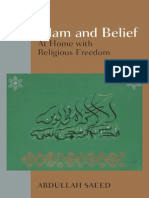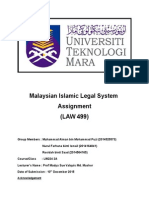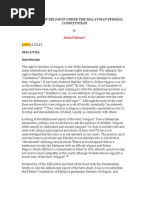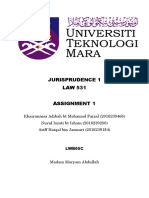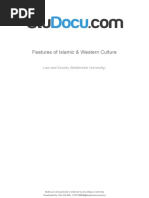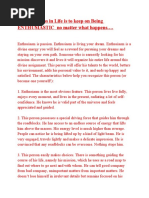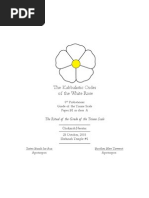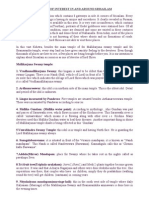0 ratings0% found this document useful (0 votes)
142 viewsBlasphemy
Blasphemy
Uploaded by
Royal GingerThis document discusses blasphemy from religious and legal perspectives. It defines blasphemy as insulting or showing disrespect for God or sacred religious concepts. Laws vary by country and religion, with some prescribing death for blasphemy. Islam, Christianity, and Judaism consider blasphemy a serious offense, though some interpretations allow for forgiveness with repentance. Debates surround restricting blasphemy versus protecting freedom of expression.
Copyright:
© All Rights Reserved
Available Formats
Download as PPTX, PDF, TXT or read online from Scribd
Blasphemy
Blasphemy
Uploaded by
Royal Ginger0 ratings0% found this document useful (0 votes)
142 views15 pagesThis document discusses blasphemy from religious and legal perspectives. It defines blasphemy as insulting or showing disrespect for God or sacred religious concepts. Laws vary by country and religion, with some prescribing death for blasphemy. Islam, Christianity, and Judaism consider blasphemy a serious offense, though some interpretations allow for forgiveness with repentance. Debates surround restricting blasphemy versus protecting freedom of expression.
Original Description:
It is about blasphemy
Copyright
© © All Rights Reserved
Available Formats
PPTX, PDF, TXT or read online from Scribd
Share this document
Did you find this document useful?
Is this content inappropriate?
This document discusses blasphemy from religious and legal perspectives. It defines blasphemy as insulting or showing disrespect for God or sacred religious concepts. Laws vary by country and religion, with some prescribing death for blasphemy. Islam, Christianity, and Judaism consider blasphemy a serious offense, though some interpretations allow for forgiveness with repentance. Debates surround restricting blasphemy versus protecting freedom of expression.
Copyright:
© All Rights Reserved
Available Formats
Download as PPTX, PDF, TXT or read online from Scribd
Download as pptx, pdf, or txt
0 ratings0% found this document useful (0 votes)
142 views15 pagesBlasphemy
Blasphemy
Uploaded by
Royal GingerThis document discusses blasphemy from religious and legal perspectives. It defines blasphemy as insulting or showing disrespect for God or sacred religious concepts. Laws vary by country and religion, with some prescribing death for blasphemy. Islam, Christianity, and Judaism consider blasphemy a serious offense, though some interpretations allow for forgiveness with repentance. Debates surround restricting blasphemy versus protecting freedom of expression.
Copyright:
© All Rights Reserved
Available Formats
Download as PPTX, PDF, TXT or read online from Scribd
Download as pptx, pdf, or txt
You are on page 1of 15
1. What is blasphemy?
2. Blasphemy in Islam, Christianity, and Judaism
3. Blasphemy in Europe
4. Blasphemy in Malaysia
5. Conclusion
According to Merriam Webster Dictionary (2018), it is “the act of insulting or
showing contempt or lack of reverence for God” or “the act of claiming the
attributes of a deity” or “irreverence toward something sacred or inviolable”.
The legal definitions of blasphemy depend in the existence of certain
elements. Examples:
Article 1 of Indonesian Presidential Decree No. 1/PNPS/1965: “Every
individual is prohibited in public from intentionally conveying, endorsing or
attempting to gain public support in the interpretation of a certain religion
embraced by the people of Indonesia or undertaking religious based
activities that resemble the religious activities of the religion in question,
where such interpretation and activities are in deviation of the basic
teachings of the religion”.
Section 298 of Pakistan Penal Code: “Uttering of any word or making any
sound or making any gesture or placing of any object in the sight with the
deliberate intention of wounding the religious feelings of any person”.
In essence, Islam teaches its followers to respect their own religion and tolerate
other religions.
Blasphemy in Islam can be counted by any action against Allah Taala, Prophet
Muhammad (BPUH) or principles of Shari’ah or anything considered sacred in
Islam.
Under the Islamic criminal law, it is categorised under Ta’zir punishment.
The Quran notifies certain existence of blasphemy, but there is no specific
punishment stipulated in Quran.
Thus, the punishments are varied according to Islam schools of legal thought and
jurisdictions of Muslim countries.
I. Blasphemy against holy personages
II. Blasphemy against beliefs and customs
III. Blasphemy against arfiacts – Quran or mosque
Hanafi – repentence, if not, dead
Maliki – death for Muslim man is mandatory
Hanbali – death is mandatory for man and woman
Shafi´i – repetence accepted, if not, death
Ja´fari - death for Muslim
Bible speaks and is concerned with blasphemy
Strictly forbidden in The Commandments
The Old Testament provides harsh punishment:
Leviticus 24:16 “Anyone who blasphemes the name of the Lord is to
be put to death. The entire assembly must stone them. Whether
foreigner or native-born, when they blaspheme the Name they are to
be put to death.”
Blaspheming God
Blaspheming Christ
Blaspheming the Holy Spirit
Blaspheming the Word
Blaspheming the Church
Hanging. The last hanged for blasphemy in GB, Thomas Aikenhead in Scotland
1697.
Stoning to death.
The followers – responsible to make sure their behaviour does not incite others to
blaspheme God or anything related to religion.
Islam – Yes, through sincere repentance and abstain from repeating it
ever.
Christianity & Judaism – Yes
“Every sin and blasphemy shall be forgiven unto men; but the
blasphemy against the Spirit shall not be forgiven” (Matthew
12:31).
Any sin for which one seeks forgiveness through God’s prescribed
plan can be forgiven. As provided in “If we confess our sins, he is
faithful and righteous to forgive us our sins, and to cleanse us from
all unrighteousness” (1 John 1:9).
• Blasphemy is present in the articles 10 and 11 of the Declaration of the Rights of
Man and of the Citizen, of 1789.
• In the EU laws, no prohibition of the punishment of blasphemy.
• There are still countries with a blasphemy law, rule or policy at some level of the
government.
• This leads to a debate on freedom of speech and religion.
• Can offense the believers
• Religions are sacred cannot laugh about it
• Exacerbate the tensions inside the population « put oil on the fire »
• Blasphemy is the fundamental part of the freedom of expression, thinking
• It is allowed to criticize a dogma
• Every representative of a monotheism is blasphemous for another religion.
• Fight the fear of fundamentalism
• Nobody force the believers to read this expression of blasphemy « it is the right to
believe or not » « unlike fundamentalism, blasphemy doesn’t kill ».
Malaysia curbs blasphemy and any insult to religion or to the religious by rigorous
control of what people in that country can say or do.
Government-funded schools teach young Muslims the principles of Islam, and
instruct young non-Muslims on morals.
The government informs the citizens on proper behavior and attitudes, and ensures
that Muslim civil servants take courses about Islam. The government ensures that
the broadcasting and publishing media do not create disharmony or disobedience.
If someone blasphemes or otherwise engages in deviant behavior, Malaysia
punishes such transgression through Shari’ah court or through legislation such as
the Penal Code.
Sections 295-298A of the Malaysian Penal Code provide penalties for those who
commit offenses against religion.
While practising one’s freedom of speech, it is essential to respect each other’s
faith and religion.
This is necessary to ensure peace and harmony in a democratic country.
Blasphemy is taken as a crime in majority countries of the world, without
specification to any religion.
You might also like
- Thomas Arentzen Et Al - Byzantine Tree Life-Christianity and The Arboreal Imagination (2021)Document203 pagesThomas Arentzen Et Al - Byzantine Tree Life-Christianity and The Arboreal Imagination (2021)Koldo Gondra del CampoNo ratings yet
- Islam and Belief: at Home With Religious FreedomDocument36 pagesIslam and Belief: at Home With Religious FreedomIslam and Religious Freedom100% (2)
- Altruism or Helping Behavior in IslamDocument5 pagesAltruism or Helping Behavior in IslamashmalikNo ratings yet
- Political System of IslamDocument13 pagesPolitical System of IslamKami Chemist100% (3)
- Islam: Between Ignorant Followers and Incapable ScholarsDocument29 pagesIslam: Between Ignorant Followers and Incapable Scholarsharoon_al_qahtaniNo ratings yet
- Dawa: The Islamic Strategy for Reshaping the Modern WorldFrom EverandDawa: The Islamic Strategy for Reshaping the Modern WorldRating: 5 out of 5 stars5/5 (1)
- South Leeds LifeDocument21 pagesSouth Leeds LifeJohn BaronNo ratings yet
- Principles of Freedom of Expression HandoutDocument6 pagesPrinciples of Freedom of Expression HandoutKonain HaiderNo ratings yet
- Assignment of ISLAMIATDocument15 pagesAssignment of ISLAMIATZara IqbalNo ratings yet
- Islam IIIDocument9 pagesIslam IIIlawalmusa4372No ratings yet
- Concept of Freedom of Religious BeliefDocument8 pagesConcept of Freedom of Religious BeliefAbdourahamane GarbaNo ratings yet
- UNHRC Study GuideDocument7 pagesUNHRC Study GuideAli AzlanNo ratings yet
- Freedom of ReligionDocument7 pagesFreedom of ReligionAdam Miguel LopezNo ratings yet
- Human Rights in IslamDocument7 pagesHuman Rights in Islamrebaraja05No ratings yet
- PakistanDocument23 pagesPakistanঅভি সুর্যবংশীNo ratings yet
- Rights of Non MuslimDocument18 pagesRights of Non MuslimSaad Ur Rehman100% (1)
- Pakistan Religious Problem.Document15 pagesPakistan Religious Problem.Ibrar HussainNo ratings yet
- Ripan Saepul Rohman 1203060100Document19 pagesRipan Saepul Rohman 1203060100Ripan saepul rohmanNo ratings yet
- Human Rights in IslamDocument4 pagesHuman Rights in Islamanzala noorNo ratings yet
- 01 Human Rights and Status of Woman in IslamDocument15 pages01 Human Rights and Status of Woman in IslamKashif AliNo ratings yet
- Human Rights in IslamDocument4 pagesHuman Rights in IslamMuhammad Faisal Ul IslamNo ratings yet
- Sociology of Law.Document7 pagesSociology of Law.stutus & top viewsNo ratings yet
- Legal Limitations Affecting Christians - Report by OIDACDocument68 pagesLegal Limitations Affecting Christians - Report by OIDACCristian RomoceaNo ratings yet
- The Issue of Apostasy in IslamDocument27 pagesThe Issue of Apostasy in IslamSo' FineNo ratings yet
- Human Rights in IslamDocument5 pagesHuman Rights in IslamTuba AbrarNo ratings yet
- Islamiat AssignmentDocument5 pagesIslamiat AssignmentAwais AhmedNo ratings yet
- Freedom in IslamDocument14 pagesFreedom in IslamMudassir AbbassNo ratings yet
- The True Islam MoralsDocument4 pagesThe True Islam MoralsfairusNo ratings yet
- Malaysian Islamic Legal SystemDocument12 pagesMalaysian Islamic Legal SystemAdryan JoseNo ratings yet
- Chp3 - Principle of Human RightDocument4 pagesChp3 - Principle of Human RightJun Wei TanNo ratings yet
- Minorities Rights in IslamDocument61 pagesMinorities Rights in IslamAbdullah NoorNo ratings yet
- Freedom of Religion 23 May 2023 2Document46 pagesFreedom of Religion 23 May 2023 2Farah KhaleedaNo ratings yet
- Top 10 Misconceptions in IslamDocument6 pagesTop 10 Misconceptions in Islamhaja_dznrNo ratings yet
- Misconceptions of IslamDocument10 pagesMisconceptions of IslamManiya NamayandehNo ratings yet
- Europe CharterDocument28 pagesEurope CharterSteve Rose0% (1)
- English - Western and Islamic Concept of Law 2003Document35 pagesEnglish - Western and Islamic Concept of Law 2003Sami AldeebNo ratings yet
- Freedom of Expression in Islam NotesDocument10 pagesFreedom of Expression in Islam NotesKonain HaiderNo ratings yet
- Freedom of Religion Under The Malaysian Federal ConstitutionDocument19 pagesFreedom of Religion Under The Malaysian Federal ConstitutionSarah Nadia100% (1)
- Australia's Efforts To Promote and Protect Freedom of Religion and Belief - Parliament of AustraliaDocument7 pagesAustralia's Efforts To Promote and Protect Freedom of Religion and Belief - Parliament of AustraliaADITI RANJANNo ratings yet
- Jurisprudence 1 LAW 531 Assignment 1Document18 pagesJurisprudence 1 LAW 531 Assignment 1KyriosHaiqalNo ratings yet
- CompleteDocument21 pagesCompleteChoudhary Ali AqdasNo ratings yet
- Blasphemy Laws in PakistanDocument3 pagesBlasphemy Laws in PakistanAli ShahNo ratings yet
- Navigating DiffDocument28 pagesNavigating Diffbajar salihNo ratings yet
- Group Leader/participants:: HM ProjectDocument27 pagesGroup Leader/participants:: HM ProjectTaha RasheedNo ratings yet
- Demistifying ShariahDocument3 pagesDemistifying ShariahHaseeb AhmadNo ratings yet
- Summary of Vatican IIDocument1 pageSummary of Vatican IIdaleandrewaguihapNo ratings yet
- A Quick Guide To Religious FreedomDocument24 pagesA Quick Guide To Religious FreedomEtsegenet MelkamuNo ratings yet
- Constitution Law Project: Right To Freedom of ReligionDocument24 pagesConstitution Law Project: Right To Freedom of ReligionAnany UpadhyayNo ratings yet
- Tolerance and IslamDocument10 pagesTolerance and IslamMaleeha AyubNo ratings yet
- Freedom of Religion in IslamDocument4 pagesFreedom of Religion in IslamAiman HakimNo ratings yet
- Rizal, José, 1861-1896. Noli Me Tangere. Suarez, Rolando, 2017. Introduction To LawDocument27 pagesRizal, José, 1861-1896. Noli Me Tangere. Suarez, Rolando, 2017. Introduction To LawGreggy BoyNo ratings yet
- Human Rights in IslamDocument30 pagesHuman Rights in IslamShamshad Ali RahoojoNo ratings yet
- Features of Islamic & Western Culture: Law and Society (Multimedia University)Document4 pagesFeatures of Islamic & Western Culture: Law and Society (Multimedia University)Jun Wei TanNo ratings yet
- Declaration of Human Right PreambleDocument8 pagesDeclaration of Human Right PreambleNicky NurfajriNo ratings yet
- Letter of SubogationDocument8 pagesLetter of SubogationSanjay SinghNo ratings yet
- Llibertat Religiosa en El Mon 2012 Pakistan PDFDocument19 pagesLlibertat Religiosa en El Mon 2012 Pakistan PDFOlibaNo ratings yet
- Hudud Punishments in Islamic Criminal LAW: Dr. Etim E. OkonDocument12 pagesHudud Punishments in Islamic Criminal LAW: Dr. Etim E. OkonBunyamin Adam ManjiNo ratings yet
- MythsDocument7 pagesMythsapi-26547187No ratings yet
- Some Random Thoughts On Concept of An Islamic StateDocument5 pagesSome Random Thoughts On Concept of An Islamic StateShams Uz ZamanNo ratings yet
- The Right of The Child and Religious Freedom in NigeriaDocument15 pagesThe Right of The Child and Religious Freedom in NigeriaNasiru029No ratings yet
- First Term Jss 2 IRK JC BestDocument14 pagesFirst Term Jss 2 IRK JC BestAuwal Abdulhamid100% (1)
- Backup of Template Calender JagaDocument12 pagesBackup of Template Calender JagaKeishaNo ratings yet
- " (T) He (Y) Did Not Read in The Sealed Book": Qumran Halakhic Revolution and The Emergence of Torah Study in Second Temple JudaismDocument22 pages" (T) He (Y) Did Not Read in The Sealed Book": Qumran Halakhic Revolution and The Emergence of Torah Study in Second Temple JudaismArtur SantosNo ratings yet
- Management of Sutika (Puerperal Women) in Ayurveda: A ReviewDocument5 pagesManagement of Sutika (Puerperal Women) in Ayurveda: A ReviewshirishkpatilNo ratings yet
- Igniting Kingdom Prayer: "Understanding Spiritual Authority"Document2 pagesIgniting Kingdom Prayer: "Understanding Spiritual Authority"laveniaclarkNo ratings yet
- A SIMPLE GUIDE TO PHILOSOPHY AND LOGIC FOR BEGINNERS pdf-1Document107 pagesA SIMPLE GUIDE TO PHILOSOPHY AND LOGIC FOR BEGINNERS pdf-1Jericho white100% (1)
- Sootak and Paatak Sushmajee ComDocument2 pagesSootak and Paatak Sushmajee Comviky24No ratings yet
- Discourse Analysis: Bulleh Shah's and Rumi's Poetry: KeywordsDocument10 pagesDiscourse Analysis: Bulleh Shah's and Rumi's Poetry: KeywordsAmeer Abbas Bhidwal100% (1)
- A True Success in Life Is To Keep On Being ENTHUSIASTIC No Matter What HappensDocument3 pagesA True Success in Life Is To Keep On Being ENTHUSIASTIC No Matter What HappensWaseq VastiNo ratings yet
- The Poems of Mulhid VadetiDocument7 pagesThe Poems of Mulhid VadetiScottie GreenNo ratings yet
- The Church FathersDocument46 pagesThe Church FathersAndré Da Paz MachadoNo ratings yet
- Diocese of Rockford StatementDocument3 pagesDiocese of Rockford StatementCrains Chicago BusinessNo ratings yet
- Preview of "'Scientology - Plan For World Peace' (1964) "Document10 pagesPreview of "'Scientology - Plan For World Peace' (1964) "selfdevNo ratings yet
- Zeus - Quick Reference CardDocument2 pagesZeus - Quick Reference Carddf74256No ratings yet
- Macdonell EarlyHistoryCaste 1914Document16 pagesMacdonell EarlyHistoryCaste 1914Vivek JoshiNo ratings yet
- SORII Judaism Prelim NotesDocument4 pagesSORII Judaism Prelim NotesKlancie FreebodyNo ratings yet
- Date OF: (3 Days)Document35 pagesDate OF: (3 Days)ArifNo ratings yet
- Dua Supplication Azkar - BookletDocument31 pagesDua Supplication Azkar - BookletFalak ImamNo ratings yet
- Navamsa: Graha Hat Why Avamsha Is Called Means Surya, So Dwadasamsa Is Called "Document5 pagesNavamsa: Graha Hat Why Avamsha Is Called Means Surya, So Dwadasamsa Is Called "Deepak ChowdhryNo ratings yet
- Fasting To Be Longest in DenmarkDocument2 pagesFasting To Be Longest in Denmarkrabia_rabiaNo ratings yet
- B1 - The Ritual of The Grade of The Tirune ScaleDocument16 pagesB1 - The Ritual of The Grade of The Tirune ScaleLinnea BredenbergNo ratings yet
- Essay On Indian ArmyDocument6 pagesEssay On Indian Armyaaqvuknbf100% (2)
- Vyasadeva Jiva-Tattva or Vishnu-TattvaDocument7 pagesVyasadeva Jiva-Tattva or Vishnu-TattvaJohn BrownNo ratings yet
- The Law of Three StagesDocument7 pagesThe Law of Three StagesAkash KumarNo ratings yet
- Foucault in Iran, Foucault in Brazil: Political Spirituality and Religious Counter-ConductsDocument31 pagesFoucault in Iran, Foucault in Brazil: Political Spirituality and Religious Counter-ConductsJosé JúniorNo ratings yet
- Chapter 7 PDFDocument33 pagesChapter 7 PDFtech jiNo ratings yet
- Lumbini The Birth-Place of Lord Buddha PDFDocument16 pagesLumbini The Birth-Place of Lord Buddha PDFMohit SunuwarNo ratings yet
- Places of Interest in and Around SrisailamDocument3 pagesPlaces of Interest in and Around SrisailamPavan Kumar KondapalliNo ratings yet

